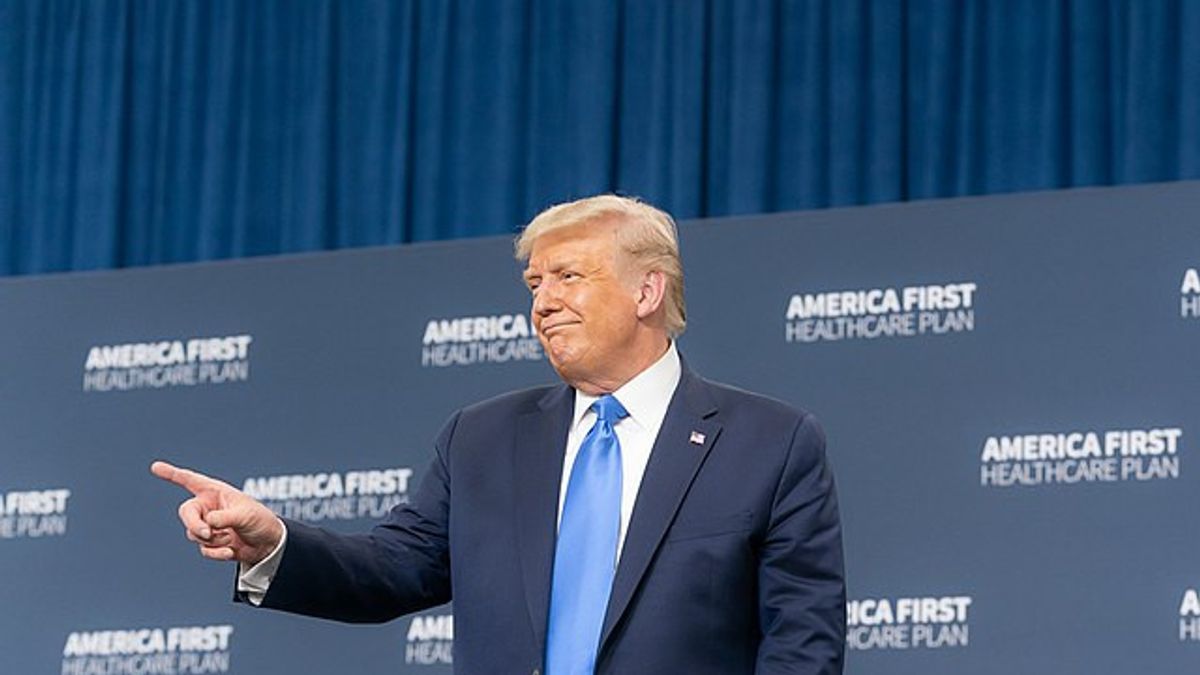JAKARTA - The United States (US) has imposed new sanctions on Iran. This time it was the turn of the foundation controlled by Iran's Supreme Leader Ayatollah Ali Khamenei to be targeted. The US is targeting foundations that they say there were human rights violations that occurred in 2019.
The sanctions announced by the US Treasury also target Iran's intelligence minister. This indicates that President Donald Trump is strengthening his "maximum pressure" campaign against Iran. The rule comes less than two months after Trump handed power to Joe Biden.
Citing Reuters on Thursday November 19, the Treasury Department imposed sanctions on what it described by the US as the main patronage network for Khamenei. Bonyad Mostazafan or the Oppressed Foundation, a foundation that Khamenei oversees, was blacklisted. In addition to the foundation, 10 individuals and 50 subsidiary companies of the foundation in various sectors including Iran's energy, mining and financial services will be blacklisted.
The sanctions also prohibit Americans from doing business with related parties from the list. Anyone who engages in certain transactions with these individuals and entities is at risk of US sanctions.
In a statement, the US Treasury Department also accused Khamenei of using foundation holdings to enrich his office, reward his political allies and persecute enemies of the regime. US Treasury Secretary Steven Mnuchin said in his statement: "The US will continue to target key officials and revenue-generating sources that will enable the regime's continued oppression of its own people."
US-Iran tensions have risen since Trump abandoned the 2015 Iran nuclear deal forged by his predecessor, Barack Obama. Trump enacted harsh economic sanctions designed to curb Iran's nuclear program, ballistic missile development and support for regional proxy forces.
Make it difficult for Biden?US President-elect Joe Biden, who will take office on January 20, said he would return the US to the nuclear deal if Iran continues its compliance. Some analysts say that the additional US sanctions that Trump is stacking appear aimed at making it harder for Biden to re-engage with Iran after taking office.
"His government is clear, and I think in a transparent manner, trying to raise the political costs for Biden if he returns to engaging with Iran and lifting the sanctions on the nuclear deal," said Henry Rome, an Iran analyst at Eurasia Group.
Roma said Trump's recent move against Iran could embarrass the supreme leader, deter non-US companies from dealing with Iranian foundations, and put the Biden administration in a potentially difficult position to justify why they did it.
The Treasury Department also imposed sanctions on Iran's Intelligence Minister Mahmoud Alavi and accused his ministry of playing a role in serious human rights violations against Iranians, including during last year's protests. The US State Department also appointed two Iranian Revolutionary Guard Corps (IRGC) officials, accusing them of involvement in the killing of nearly 150 people in the city of Mahshahr during last year's crackdown. Sanski was given forbidding them and their immediate family from traveling to the US.
The 2019 crackdown is perhaps the bloodiest crackdown on protesters in Iran since the 1979 revolution. About 1,500 people died in less than two weeks of unrest that began on November 15, 2019. The toll was given by three Iranian Interior Ministry officials.
Iran's Interior Ministry said about 225 people were killed during the protests, which erupted after state media announced that gas prices would rise by as much as 200 percent. As a result of this increase, the income will be used to help families in need.
The English, Chinese, Japanese, Arabic, and French versions are automatically generated by the AI. So there may still be inaccuracies in translating, please always see Indonesian as our main language. (system supported by DigitalSiber.id)












